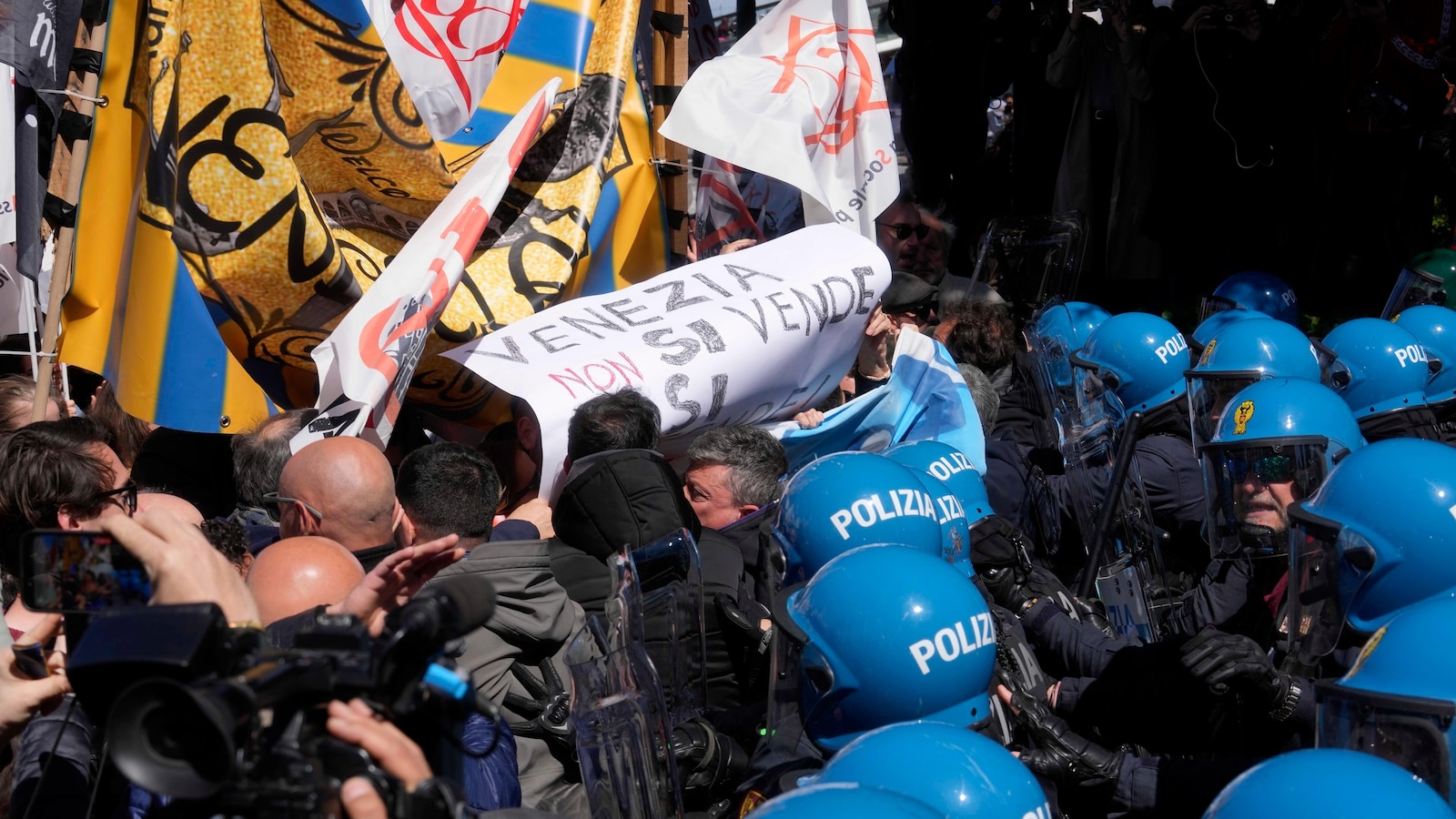
VENICE, Italy — Venice on Sunday wrapped up a pilot program charging day-trippers an entrance fee, more than 2 million euros ($2.2 million) richer and determined to extend the levy, but opponents in the fragile lagoon city called the experiment a failure.
Several dozen activists gathered outside the Santa Lucia train station overlooking a teeming canal on Saturday to protest the 5-euro ($5.45) levy that they say did little to dissuade visitors from arriving on peak days, as envisioned.
“The ticket is a failure, as demonstrated by city data,” said Giovanni Andrea Martini, an opposition city council member.
Over the first 11 days of the trial period, an average of 75,000 visitors were recorded in the city. Martini said that is 10,000 more each day than on three indicative holidays in 2023, citing figures provided by the city based on cell phone data that tracks arrivals in the city.
Venice imposed the long-discussed day-tripper tax on 29 days this year, mostly weekends and holidays, from April 25 through mid-July. The project, delayed by the pandemic, was heralded by UNESCO member states when they decided against a recommendation to place the city on its list of world heritage sites in danger.
Over the last 2 1/2 months, nearly 450,000 tourists have paid the tax, raising revenues of some 2.2 million euros ($2.4 million), according to AP calculations based on data supplied by the city. Officials said the money would be used for essential services, which cost more in a city traversed by canals, including trash removal and maintenance.
The levy was not applied to people staying in hotels in Venice, who are already charged a lodging tax. Exemptions also applied to children under 14, residents of the region, students, workers and people visiting relatives, among others.
The city’s top tourism official, Simone Venturini, has indicated that the levy will be continued and reinforced. A proposal to double the fee to 10 euros is being considered for next year, a city spokesman said.
Officials promised steep fines for scofflaws, but in the end none was given during checks at entry points, which varied from a low of 8,500 to a high 20,800 a day over the period. City officials say that is because they wanted a soft launch. Critics say it resulted in a downward trend in payments as visitors understood there was no risk in avoiding the payment.
Opponents of the plan say it failed to make the city more liveable for residents, as intended, with the narrow walkways and water taxis as crowded as ever. They want policies that encourage repopulation of Venice’s historic center, which has been losing residents to the more convenient mainland for decades, including placing limits on short-term rentals.
There are now more tourist beds in the canaled historic center than official residents, whose numbers stand at an all-time low of 50,000.
“Wanting to raise this to 10 euros, is absolute useless. It makes Venice a museum,” Martini, the city council member, said.
Many of the banners at Saturday’s protest also indicated growing concern about the system of electronic and video surveillance that the city introduced in 2020 to monitor cell phone data of people arriving in the city, which is the backbone of the system to control tourism. Placards included warnings about use of personal data and a lack of data privacy.
“The access ticket is a great distraction for the media, which only speaks about this 5 euros, which will become 10 euros next year,’’ said Giovanni Di Vito, a Venice resident active in the campaign against the tourist tax. “But no one is focusing on the system for surveillance and control of citizens.”
Venice, known for its picturesque canals and historic architecture, has long been a popular destination for tourists from around the world. However, the city has also been struggling with issues related to overtourism, such as overcrowding, environmental damage, and strain on local resources. In an effort to address these challenges, Venice implemented a day-tripper tax pilot program in July 2019.
Under the pilot program, visitors who come to Venice for the day and do not stay overnight are required to pay a tax of 3 euros per person. The tax is collected by transportation companies, such as cruise operators and bus companies, and then passed on to the city. The goal of the tax is to generate revenue that can be used to offset the costs associated with managing the influx of day-trippers and to fund conservation and preservation efforts in the city.
According to recent reports, the day-tripper tax pilot program has been a success, generating approximately $2.2 million in revenue in its first year of operation. This revenue has been used to fund a variety of initiatives, including increased trash collection and recycling efforts, improved public transportation services, and restoration projects for historic buildings and monuments.
In addition to generating much-needed revenue, the day-tripper tax pilot program has also had other positive effects on Venice. By discouraging day-trippers from visiting the city, the program has helped to reduce overcrowding and alleviate some of the strain on local infrastructure. This has improved the overall experience for both visitors and residents alike.
While the day-tripper tax pilot program has been successful in generating revenue and addressing some of the challenges associated with overtourism, it is important to note that it is still a pilot program and its long-term effects are yet to be fully realized. However, many see it as a step in the right direction towards creating a more sustainable tourism model for Venice and other popular destinations around the world.
Overall, the day-tripper tax pilot program in Venice has shown that innovative solutions can be effective in addressing the negative impacts of overtourism. By generating revenue and funding conservation efforts, the program is helping to preserve Venice’s unique cultural heritage for future generations to enjoy.


